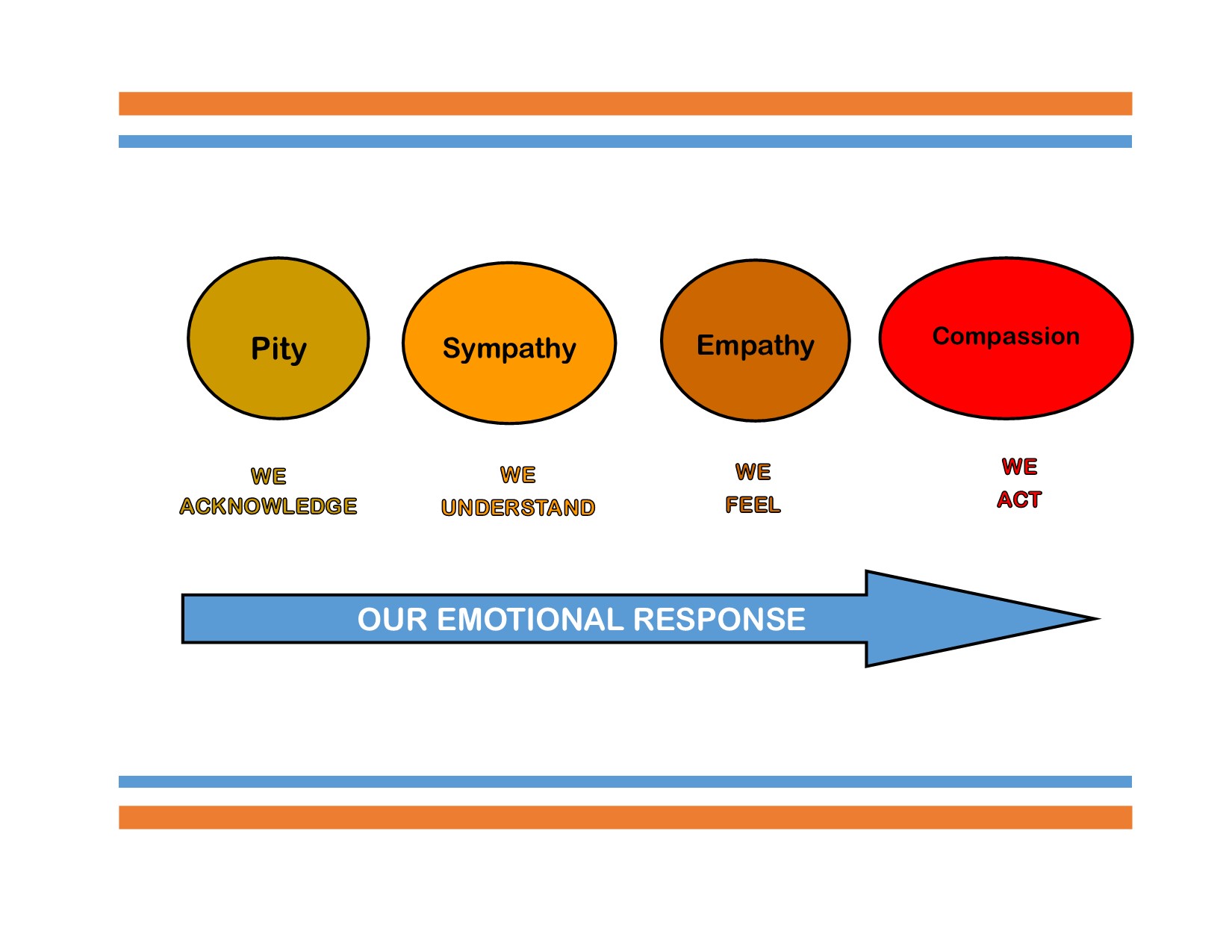Our Emotional Response (ER)
Last week, we described compassion as a willingness to relieve the suffering of another. With that definition we introduced a series of emotional responses (ERs) to the pain and suffering we experience. The intent was to help us better understand the differences in our emotional response to the anguish and distress of others.
Our ER can fall on a continuum ranging from pity to compassion. This is summarized below: 
As we survey our cities, nation, and the world, we appear to be more jaded in our feelings concerning the plight of others. This cynical view has begun to infiltrate, not only our personal response but has become reflected in our reaction to the growing social issues and “human problems” we face each day. For example, can we honestly say that our education, health, and social systems reflect compassion for the people they are to serve? Are we REALLY our brother’s keeper (Gen. 4:9)?
I wonder what God has to say about our ER to the conditions of our world. Does God view compassion in the same way we do? This week we will explore how our view of compassion differs from God’s view.
Will the compassionate people please stand?
How would you describe a compassionate person? Would you describe yourself as compassionate? You may be sometimes and then at other times, not compassionate at all? Why the difference in ER?
The Greater Good of Berkeley University define compassion as a mental state or orientation toward suffering (your own or others’) and includes four components:
-
- Bringing attention or awareness to recognizing that there is suffering (cognitive)
- Feeling emotionally moved by that suffering (affective)
- Wishing there to be relief from that suffering (intentional)
- A readiness to take action to relieve that suffering (motivational)
This explanation does not consider other factors that may also impact our ability to respond with compassion, such as understanding the nature of the situation and the effort required to resolve the situation.
Where’s the compassion?
If we look at Jesus’ parable of the Good Samaritan (Luke 10:31-37), what were the orientations or mental states of the travelers, as described by The Greater Good.
Now by chance a certain priest came down that road. And when he saw him, he passed by on the other side. Likewise, a Levite, when he arrived at the place, came, and looked, and passed by on the other side. But a certain Samaritan, as he journeyed, came where he was. And when he saw him, he had compassion.
Where did the train go off the rails? The priest “saw”. The Levite “came and looked.” Only the Samaritan moved passed the cognitive response and moved directly to motivational. “The Samaritan came where he was and when he saw him, he had compassion”.
So, he went to him and bandaged his wounds, pouring on oil and wine; and he set him on his own animal, brought him to an inn, and took care of him.
More like God
The Hebrew and Greek words sometimes translate “compassion” to have a broader meaning such as “to love” and “to show mercy.” Synonyms for compassion in English are “to be loved by,” “to show concern for,” to be tenderhearted,” and “to act kindly.” Do these words describe you?
Compassion is an inherent part of God’s very being (Exod. 34:6). In the Old Testament, God’s compassion was rooted in His covenant relationship with His people (2 Kings 13:23).
In the New Testament, God’s compassion is demonstrated in His Son’s ministry and among His people. Jesus’ messianic compassion was extended to the helpless crowds (Matt. 9:36), the sickly masses (Matt. 14:24), the hungry people (Mark 8:2), the demon possessed (Mark 5:90), the unclean lepers (Luke 5:12-16), and to all in need of “love and mercy” (Isa. 61:1-3).
In our generation, Jesus has extended compassion to each of us—the hopeless sinner (Rom. 5:8). While compassion is not a uniquely Christian response to suffering (Luke 10:33), Christians have unique reasons for nurturing our compassionate disposition. God compassionately and truly cares what happens to us. We will talk more next week about how to develop a more compassionate disposition and its importance in navigating 21st century living.

